#Elvis Presley legacy discussion
Explore tagged Tumblr posts
Text
Elvis is Everywhere | Tales From Hollywoodland
New Post has been published on https://esonetwork.com/elvis-is-everywhere-tales-from-hollywoodland/
Elvis is Everywhere | Tales From Hollywoodland

In this podcast episode, Julian, Steve, and Arthur are joined by producer Mike in a rich discussion about Elvis Presley’s profound influence on the entertainment industry. They reminisce about Elvis’s captivating performances, his controversial gyrations, and his groundbreaking role in popularizing rock and roll. The conversation covers the strategic management by Colonel Tom Parker, Elvis’s transition from movies to live shows in Las Vegas, and the missed opportunities in his career. Personal anecdotes reveal Elvis’s interactions with fans and the challenges he faced, including financial struggles and drug use. The episode paints a comprehensive picture of Elvis’s legacy, his cultural impact, and the lasting significance of his work in music and film.
Tales From Hollywoodland on Facebook https://www.facebook.com/talesfromhollywoodland
Tales From Hollywoodland on Instagram https://www.instagram.com/talesfromhollywoodland/
Tales From Hollywoodland on YouTube https://www.youtube.com/channel/UCdLX2kbwHqdn47FNN6vVN7Q
We want to hear from you! Feedback is always welcome. Please write to us at [email protected] and why not subscribe and rate the show on Apple Podcast, Spotify, iHeartRadio, Goodpods, PlayerFM, YouTube, Pandora, Amazon Music, Audible, and wherever fine podcasts are found.
#TalesFromHollywoodlandPodcast #ElvisPresleycareer #ElvisPresleydiscussion #Elvismusiclegacy #ElvisPresleymovies #Elvisrockandroll #KingofRockandRoll #ElvisHollywoodcareer #ElvisPresleyachievements #ElvisPresleyhistory #ElvisPresleyinfluence #ElvisPresleypopculture #ElvisPresley #ElvisPresleyimpact #ElvisPresleylegacydiscussion #Podcast
#Arthur Friedman#Elvis Hollywood career#Elvis music legacy#Elvis Presley achievements#Elvis Presley career#Elvis Presley discussion#Elvis Presley history#Elvis Presley impact#Elvis Presley influence#Elvis Presley legacy discussion#Elvis Presley movies#Elvis Presley podcast episode#Elvis Presley pop culture#Elvis rock and roll#Julian Schlossberg#King of Rock and Roll#Podcast#Steven Jay Rubin#Tales From Hollywoodland podcast
1 note
·
View note
Note
This may be a prickly subject, and I'm sorry if so. But I'm trying to learn more about Elvis, and every time I bring him up to people I know, they try to tell me he was this terrible person, and point me toward Priscilla's book, the movie made on it, and the discourse. Idk if you've talked about it on here (I tried searching your blog but couldn't find anything on it). If you're willing, I'd love to hear your take on it so I can see a more nuanced view.
The film Priscilla was greenlit roughly a month after Priscilla herself was informed that she was close to becoming financially insolvent in 2022. With a business partner, Brigitte Kruse, who allegedly helped broker the film deal, she established a limited liability company called Priscilla Presley Partners that was supposed to use her image and likeness to create several lines of merchandise to coincide with the film's release. That business partner is now suing Priscilla because she did not have the rights to her image or likeness, or any ability to use the Presley name, because she had already sold all of those rights and was no longer considered in good standing with Graceland or Elvis Presley Enterprises. The entire business deal, then, according to the lawsuit, was built on her misrepresentation of how much her image was worth.
The deal between the two of them fell apart after Riley Keough, Lisa Marie's daughter and Priscilla's granddaughter, settled with Priscilla to give her a lump sum of $1 million from Lisa Marie's estate and yearly amounts of $100,000. Priscilla sued very shortly after Lisa Marie's death because she thought Lisa Marie's signature on a will had been forged because Priscilla was not included in it. All of the assets were supposed to go directly to Lisa Marie's son, Benjamin Keough, who died in 2020, and her three daughters, two of whom are still teenagers. Now, part of those assets have been claimed by Priscilla and her other son, Navarone, who has no connection to the Presley family and has stated he is glad Lisa died.
Four months before Lisa's death, Lisa wrote to Sofia Coppola and made it clear she had strong concerns about the Priscilla film and was suspicious of the intentions behind it:
"As his daughter, I don’t read this and see any of my father in this character. I don’t read this and see my mother’s perspective of my father. ... I will be forced to be in a position where I will have to openly say how I feel about the film and go against you, my mother and this film publicly."
Lisa was enormously grateful for efforts put into 2022's Elvis to find her father's soul and to restore his dignity in a world that often turns him and his family into a joke:
"You can feel and witness Baz’s pure love, care, and respect for my father throughout this beautiful film, and it is finally something that myself and my children and their children can be proud of forever."
It is such a strong and powerful statement, to see how much Lisa valued family, not just her father but her own children and their legacy, and how willing she was to speak up no matter what was going on in her personal life to say what was right. On this and many other things, Lisa and Priscilla's values have rarely been in alignment. A friend and EPE business associate, Joel Weinshanker, said of her, "Lisa couldn't be bought, she couldn't be pushed. If she felt that something wasn't in Elvis' best interest, it was never about money. And she really is the only Presley that you could say that about."
Priscilla, though, has adjusted her stories about her time with Elvis almost every time she discusses it. For a quick example, she said in her book, which was released in 1985, that Elvis insisted she do her hair and makeup a certain way, that he had control over her look and would get upset if she didn't dress how he wanted. But in an interview with Ladies' Home Journal in 1973, she said that she made a deliberate choice to attend makeup school so that she could learn how to style herself, and that it was her idea to wear big, black hair and big, black eyeliner. She said she was embarrassed for going overboard. She said, "I wish that Elvis had said something, but he must have liked it because he never commented." This lines up with recollections from Patti Parry, a platonic friend of Elvis' and a hairstylist, who said Priscilla always wanted Patti to do her hair in a "big boombah," but that Priscilla would then get upset when Elvis didn't notice or didn't like it.
These changes are impossible not to notice if you follow her for any length of time. At the film premiere, she said it felt just like watching her life and said she was consulted on everything, since she was an executive producer. After the film came out, she said she couldn't understand why Coppola had changed so much about the story and misrepresented events. In the '70s, she said she and Elvis lived almost totally separate lives, that she came and went as she pleased, and that she loved this freedom. Later, she said she felt completely stifled and trapped and never left the house, even though she had friends she went out with all the time. In 2019, she tweeted a forceful denial about a National Enquirer story: "This is the Enquirer folks... please don't believe everything you read. ... Never planned on being buried next to Elvis. What will they come up with next?" But part of her settlement demands in her lawsuit against Riley in 2023 asked "to be buried next to Elvis." This year, she said in two separate interviews that Lisa was with her when Elvis died and that Priscilla had to break the news to her, despite the fact that Lisa was at Graceland when it happened. She has said she gave Elvis the idea to wear belts on his jumpsuits, to have a lightning bolt as his logo, to sing "An American Trilogy," though none of that is true. She retells the story about forcing Elvis to burn all of his spiritual books to prove he loved her as an almost funny anecdote about debrainwashing him, while Elvis later said it was the worst thing he ever agreed to, a desperate attempt to make her happy by giving up the things he valued the most. (For the record, this is my opinion about their relationship on both sides: thinking they could change themselves and each other to make it work. It never did.)
Every secondhand Elvis account has to be treated lightly and only valued for its consistency with known facts and other witnesses. I try to give enormous benefit of the doubt to anyone in the Elvis world because they often only have partial knowledge of what Elvis may have been thinking at any given time, and there are numerous examples of people who were taken advantage of by unscrupulous journalists who changed the story they wanted to tell. But Priscilla's stories sometimes are not even consistent with her own statements, which makes them very poor options indeed to base anything on. However careful we are about noting potential biases and inaccuracies in other memoirs, we have to be triply, quadruply careful with anything in which Priscilla involves herself because she has a vested interest in generating discourse today in order to make money. Unfortunately, Priscilla has a habit of stifling other accounts or making sensationalized statements each time there is a possibility that she will lose some of the cachet that comes with being an Elvis Source—after Elvis' death, when she believed she was going to inherit his airplane and disinvited everyone that Vernon said could fly in it to his funeral; when she sued the parents of one of Elvis' ex-girlfriends after he died because he had allowed them to live rent-free in a house he bought for them; when she claimed that Elvis wanted to reunite with her before his death, despite the fact that he was engaged to someone else and told many people he couldn't see a reunion ever happening with her; before Vernon's death, when she convinced him to make her an executor of the Presley estate until Lisa came of age; after Lisa came of age, when she convinced Lisa to let her stay on as partner; when Lisa accused Priscilla of misspending Lisa's money, during which time anonymous sources cropped up to say Lisa was in debt and drug-addled; when Priscilla was removed from her position as an EPE spokesperson but kept collecting $900,000 a year from the company; when Lisa died, and Priscilla sued once she learned she wasn't in the will; when Priscilla was no longer associated with EPE and decided to do another adaptation of a book that she has since recanted parts of and has contradicted before and after its release.
When Priscilla thinks there is a threat to her image and position, she does new interviews and projects to muddy the waters and stir public interest, whether it is true or false, positive or negative, laudatory or defamatory. She gets corrected by Elvis' surviving family members, girlfriends, friends, and fans, but these stories do not get the same reach no matter how much they are backed by contemporaneous documents and witnesses, or how many resources there are to educate the public on how Elvis' and Priscilla's attitudes about marriage and relationships changed—along with the rest of society—between 1960 and 1970.
I think almost any single-source project is not going to advance our understanding of Elvis in any way because no one individual can speak for him, and we are kind of obligated to include all the context we can in order to appreciate his character, his successes and failures, flaws and virtues—and to treat both himself and those around him as fully three-dimensional people who have their own blind spots. Priscilla is far too aware of her own image, and far too willing to change it to suit the audience, to be particularly valuable here.
She is next scheduled to appear at the Lexington (Kentucky) Comic & Toy Con.
#please know that for each of these stories i have tried to see things from her perspective#and then something happens again#and again and again#so i have simply stopped trying and accepted that i don't like her or find her credible as far as these things go#i don't imagine i should be privy to all their family drama so of course some of this may change over time#but there are far far far better sources for learning about elvis!#an easy gateway would be ashley's adventures and elvis fans matter on youtube!#ashley does a lot of fun documentation of graceland and efm is the family channel of billy and jo smith#they are elvis' cousin and his wife who were with elvis a lot and they have good human stories#same caveat goes for them: they might not know everything#but i just like the format better than books
113 notes
·
View notes
Text
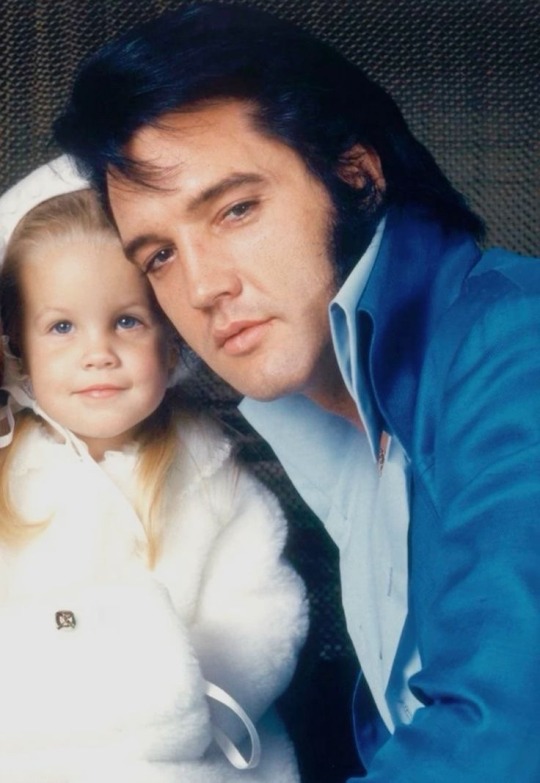
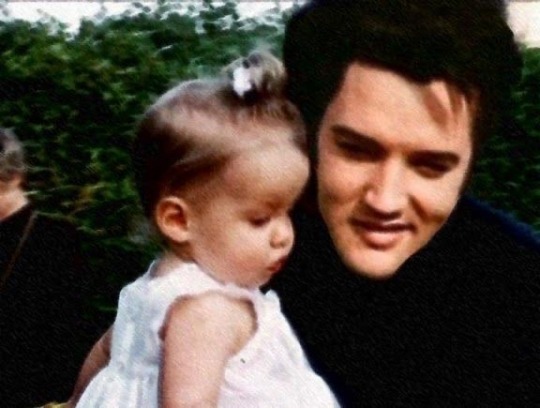
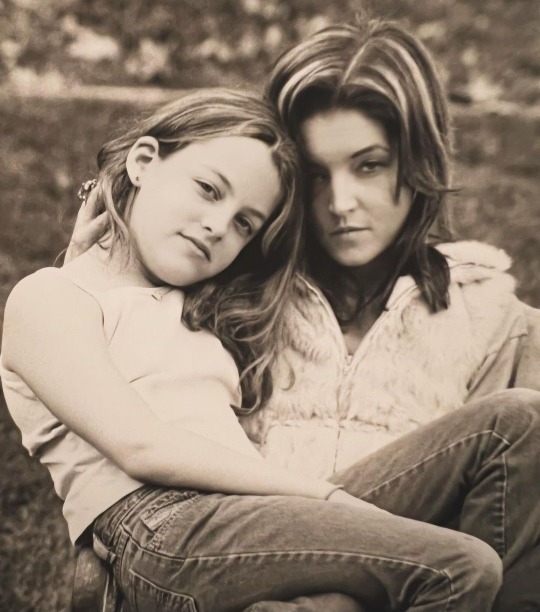
Book review
From Here To The Great Unknown
Author: Lisa Marie Presley and Riley Keough
Pages: 304
Rating: 5/5
Disclaimer:
The opinions shared in this review are my own personal thoughts and feelings about From Here to the Great Unknown by Lisa Marie Presley. Please respect my perspective, as it comes from my own interpretation and emotional connection to the book.
This is a safe space for open discussions, not negativity. If you disagree or don’t like what I’ve said, that’s okay! Feel free to scroll past or ignore the post—there’s no need for hate or unnecessary criticism.
Also, please be aware that this review contains spoilers about the book. If you haven’t read it yet and want to experience the story firsthand, you might want to come back to this after you’ve finished reading. Thank you for understanding!

Lisa Marie Presley’s From Here to the Great Unknown defies traditional memoir conventions while still delivering an intimate, soul-baring account of her life. It feels less like a polished narrative and more like a heartfelt conversation, as if Lisa Marie is sitting across from you, speaking her truth in a way that is deeply personal and unguarded. There’s no performance here—no attempt to embellish or dilute the rawness of her experiences. Instead, the book is steeped in emotion, so much so that it becomes almost overwhelming at times.
At its core, this book offers a window into a life marked by extraordinary fame and profound loss. For many, her story might begin with the death of her father, Elvis Presley—a loss that has been mythologized and scrutinized for decades. But for Lisa Marie, it was only the beginning of a lifelong struggle with grief and the weight of a legacy that, as much as it elevated her, also bound her. She doesn’t just recount events; she explores their emotional impact, pulling readers into the turbulence of her world.
What stands out most is the sheer honesty in her reflections. Lisa Marie doesn’t attempt to hide behind the veneer of her famous last name. She opens up about the constant comparisons to her father, the relentless spotlight, and the toll it took on her sense of self. Her perspective is refreshing because it’s not tinged with bitterness or self-pity but rather a genuine desire to share her reality.
The most harrowing parts of the book are her accounts of loss. Lisa Marie brings readers into the most painful moments of her life, from witnessing her father’s death as a young girl to the unimaginable grief of losing her son. These experiences, which might seem surreal to an outsider, are written with such clarity and emotional depth that they become almost tangible. You don’t just read about her pain—you feel it.
And yet, this isn’t a story of despair. While the grief and sadness are palpable, there’s also a quiet strength in her words—a testament to her resilience. Lisa Marie’s ability to keep moving forward, even when life has thrown unimaginable challenges her way, is both humbling and inspiring.
From Here to the Great Unknown also offers a glimpse into the darker side of fame. It challenges readers to consider what it truly means to live under a microscope, where every move is analyzed and compared to a larger-than-life figure. In an age where many idolize fame, this book is a stark reminder that it often comes at a tremendous cost.
Ultimately, Lisa Marie Presley’s memoir is for anyone who wants to see beyond the glitter of fame and understand the human being behind the headlines. It’s for those who seek stories of resilience, those who want to explore the intricacies of grief, and those who are simply curious about what it’s like to grow up as the daughter of an icon.
From Here to the Great Unknown isn’t just a book—it’s an experience. It’s raw, heartbreaking, and deeply human, leaving you with a profound respect for Lisa Marie Presley and the strength it took to share her story.
Riley did an amazing job making also notes and sharing how was Lisa Marie as a mother, she was caring, loving and she didn’t let her past traumas affect how she raised Riley, Benjamin, Finley and Harper.
Some of my favorite pages…
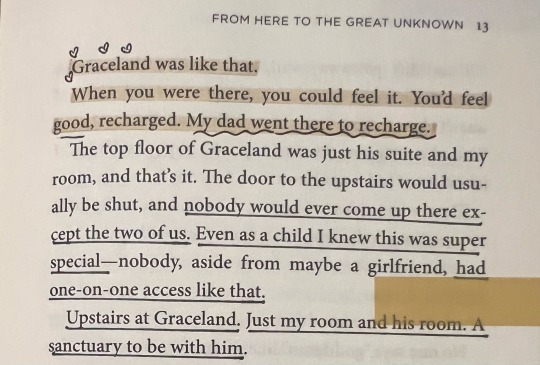

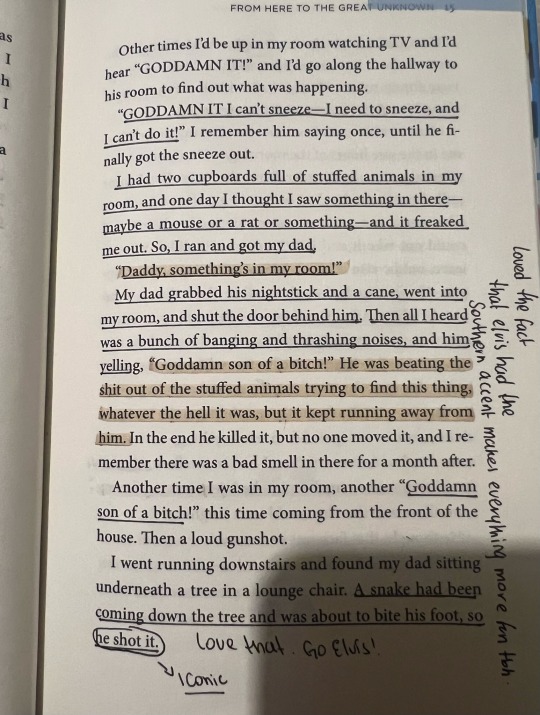
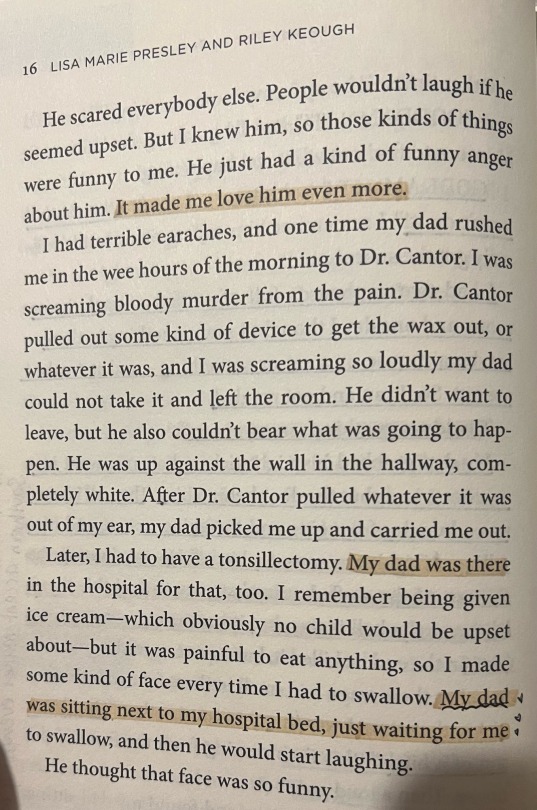
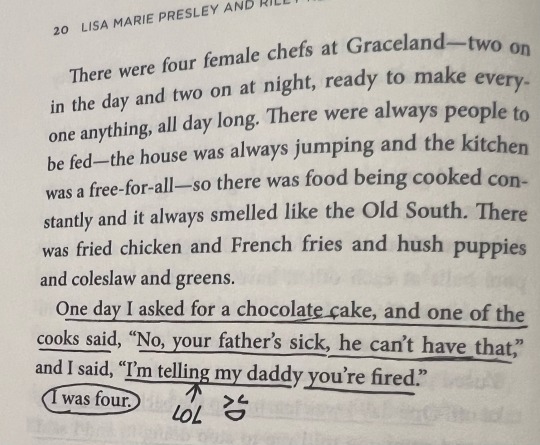
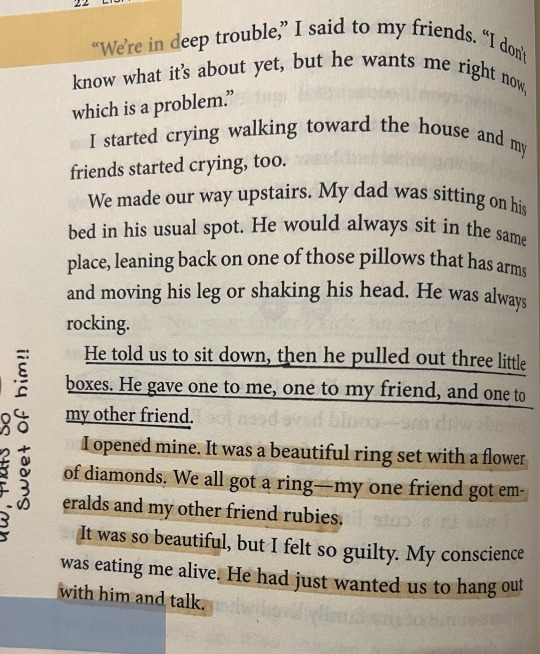
#elvis presley#elvis#elvis fans#70s elvis#elvis history#elvis the king#elvisedit#60s elvis#elvisaaronpresley#from here to the great unknown#book review
22 notes
·
View notes
Text
I avoid talking about his death for obvious reasons. I think the people we love, rather they're close to us or idols we look up to, need to be talked about for when they were alive, the things they did that brought joy to our lives, the things they taugh us, how they made us stronger, the gratefulness that fills our hearts for the love they left in us and that is neverending. Very seldom you'll see me discussing Elvis' death - and well, there's nothing I would like to discuss on that, actually. I would just like to share a video with Sheriff Morgan talking about the last time he was with Elvis, the day before EP passed away, and how he found out what happened on the August 16th 1977. There's a portion of this video that touched my heart so deeply, and that's the reason why I'm sharing this video with you.
Sheriff Morgan said:
"I remember when President Kennedy died. I was in high school. It was one of those moments when time stops. Well, with Elvis it was the same thing, but it lasted longer."
youtube
I just watched a video from Billy and Jo Smith's Youtube channel were the topic was Elvis' death as well (you may watch it here). It was a very emotional video, they shared tears remembering the events and all, but they said the exact same thing: It seemed that time stopped. That's naturally what happens when someone you love passes away. The chock gets you out of it, confused, and you don't know what to do, how to behave, how to feel, where to go, what to say... and you go through denial for a period of time, thinking about how life's gonna be from then on. But life goes on and it's one of the most unfair, painful things to accept - that life goes on and that beloved person is left only in memories and hearts, that there'll be no more new moments of joy shared between you and you'll have to hold onto the sweetest memories you have made until that point. That's why we need to talk about their lives rather than the death time. So we can keep feeling they're with us. That's how I feel Elvis, as a fan... I feel he's alive. I don't like to talk or read or listen about his death whatsoever - don't even get me started on funeral pictures, ugh! - because it makes me feel like time stopped and I get through that grief for days, and I get angry he was taken from us so soon. The topic itself makes me question if I'm being a fan for no reason - like I'm getting excited about things that are long in the past and are meaningless now he's not here anymore (for a long time), and that's not the truth. Everything Elvis did in life had repercussions, and we are one of them. We are still here. He lives through each one of us. The joy Elvis brings to our days is very much real, very strong and deep... and through us, he is alive. He is alive in our heart and minds, through our lips, through our feelings. Always will be. But anyway... that thing Sheriff Morgan said made me feel glad over how deep he touched people's hearts. He was so dear, so loved, so cared for. And I love that. He deserves all of those beautiful feelings we have for him. He gave us so much of himself. Elvis was a precious soul, no doubt about it, and he deserves all the love we can pour on his memory, on his legacy - and most of all, he deserves respect.
Elvis Presley is still missed, after all this time. That's beautiful. We'll always miss him for there's nobody else that could make us feel the way he did. God bless his soul in Heaven and let him feel how much we care for him and how deeply we respect and appreciate all he did in life. Elvis, we love you.
10 notes
·
View notes
Note
Hi! First of all, I love ur blog it’s one of my favourites and I really appreciate your nuanced takes and the research you put in to your answers. :)
I wanted to ask you — I read today that EPE didn’t allow Sofia Coppola to use any of Elvis’ music in her movie. I figured he wouldn’t be depicted very positively in it but I kinda hoped it would be a realistic and human depiction of both of them, not like sort of a condemning ‘he’s the villain of their story’ vibe lol. I guess we still won’t know until it comes out… Anyway it got me feeling like perhaps the depiction will be more negative, but maybe EPE just didn’t consent to his music being used because they weren’t included in the movie. Hard to know. Wanted to ask for your thoughts/take on it.
Also, what do you think Lisa would think about this movie being made?

this just made my day 😭, you are the sweetest <3!! I cannot thank you enough for taking the time to show your appreciation, it truly means the world to me that you get something positive out of my posts
also thank you very much for the ask, I really love to be able to have open discussions on here with fellow Elvis fans, especially regarding all the recent events that are taking place 🤧
as for your question, according to the latest interview with Sofia Coppola and Priscilla Presley, it was “Authentic Brands Group” (who owns 85% of EPE) that denied the request to have Elvis’ music featured in the film. As Sofia tells it, it was because ABG only endorse projects that they have originated as they are protective of their brand ⬇️
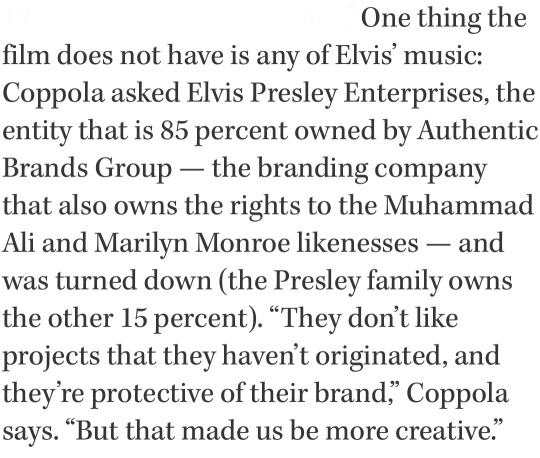
(quote from the “Hollywood Reporter”)
so I don’t think Elvis’ music not being in the film is indicative of how he will be portrayed, the decision seems more business based than anything else (hopefully 😭). I’m also wondering if this was a funding issue as this film doesn’t seem to have had the biggest budget (they only had 30 days to shoot) and I would assume the rights to use Elvis’ music would be rather costly 👀
as for how Elvis will be depicted… I think I speak for many other fans when I say when this movie was first announced my heart sank 🤧 the 2022 film accomplished so many amazing things for Elvis and his legacy and I think we all felt like this Priscilla movie would jeopardize that. But this recent interview with Priscilla, along with the film’s official synopsis, has given me more hope that this movie will be more nuanced
Priscilla telling Cailee Spaeny, the actress portraying her, to be sensitive towards Elvis honestly made me breathe a sigh of relief 😩
(quote from the “Hollywood Reporter”)
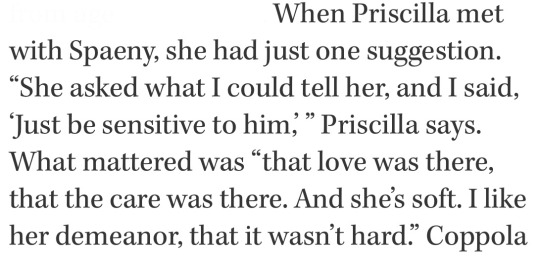
But I think the reason so many fans are still currently dreading this film and biting their nails over the release of it is because of the reception it has received online… particularly by non-Elvis fans
if you have Instagram or Twitter (especially) you know what I mean 😭
people are literally praising Sofia Coppola (even Priscilla) because they think this film is going to be a hit piece against Elvis and will expose how he “groomed” and “abused” her
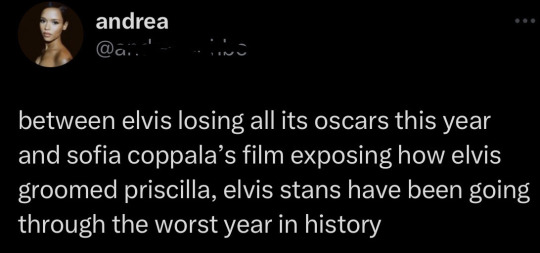
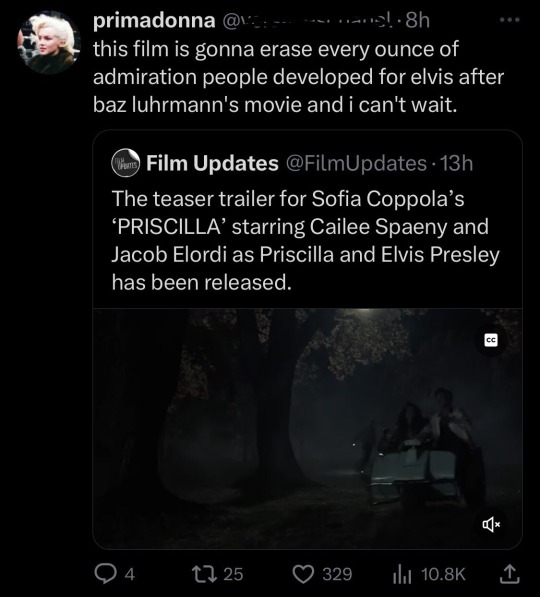
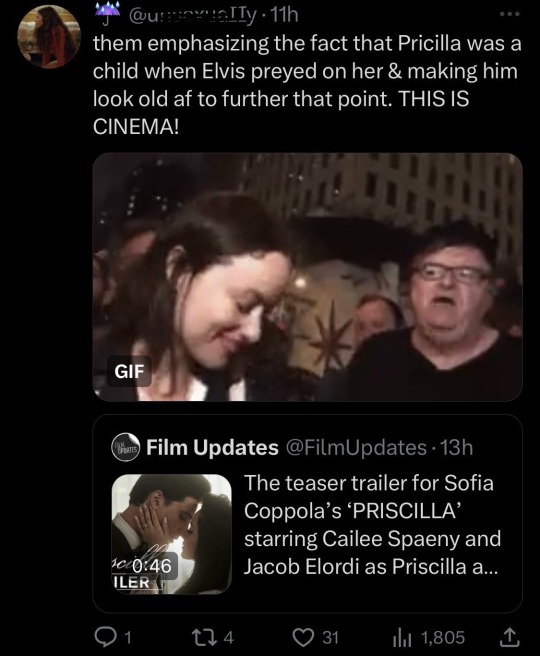
I can almost guarantee these people and anyone else who have made similar comments have never even read Priscilla’s book, or have ever read about Elvis besides what they see on social media through things like twitter threads on how he was a “predator” or how he “stole” music from black musicians
their dedication to believing whatever they see written about him just proves their ignorance to me. If they haven’t taken the time to research the claims made about him then I just disregard their opinion🤧 I’ve really struggled with disengaging from people who hate Elvis but I’ve begun to learn that nothing we say as fans will change their opinion of him, and no matter what they say, it cannot change who we know he really was
and whenever I do see these people reference Priscilla’s book I’m like… did we read the same book? did y’all not see how 90-95% percent of that book praised who Elvis was? and do y’all not see how Priscilla still defends his actions to this day and says things like “he was the love of my life”? I’m just confused as to why these people think Priscilla wants Elvis to be “exposed” 😭
and like the majority of people who have written about Elvis, Priscilla’s book has the good, the bad, and the ugly, and I expect the film to be that way as well. However, I hope the good completely outweighs “the bad” and “the ugly” just as much as it did in Priscilla’s book
People always hyper-inflate the “bad” stories (of which there are very few) that are mentioned in Priscilla’s book. For example the story where when they were pillow fighting he accidentally gave her a black eye, which is also referenced now as proof that he “abused” her. But they won’t mention how Elvis profusely apologized and felt incredibly guilty, nor do they mention how Priscilla blamed the pills they were taking for Elvis’ temper in that moment, as opposed to Elvis himself
(excerpt from “Elvis and Me” by Priscilla Presley)
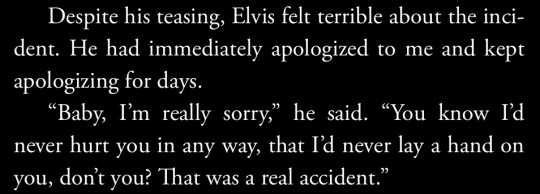
I feel like a lot of anger has been misdirected towards Priscilla lately regarding stories like this but in all honesty you cannot blame her for people taking what she wrote out of context. I’ve seen some fans say that she is only out to make Elvis look bad but she very clearly states he was remorseful for the incident
Like I mentioned above, I think 90-95% of her book puts Elvis in a good light, and shows how truly good his character was
One of my personal favorite stories is the lasagna incident, where Priscilla insisted on cooking for the whole group and in her nerves for proving that she could do such a thing, she forgot to boil the noodles before assembling the dish 💀
and this story is just one out of dozens that show how sensitive Elvis was to Priscilla
(excerpt from “Elvis and Me” by Priscilla Presley)
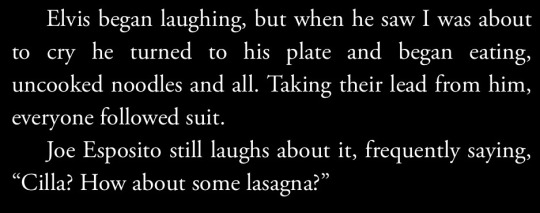
not to mention the very last paragraph of her book where she has nothing but good things to say about him… yet people who hate Elvis think this film, that is based on her book, will be out to “expose” him 😩?
(excerpt from “Elvis and Me” by Priscilla Presley)
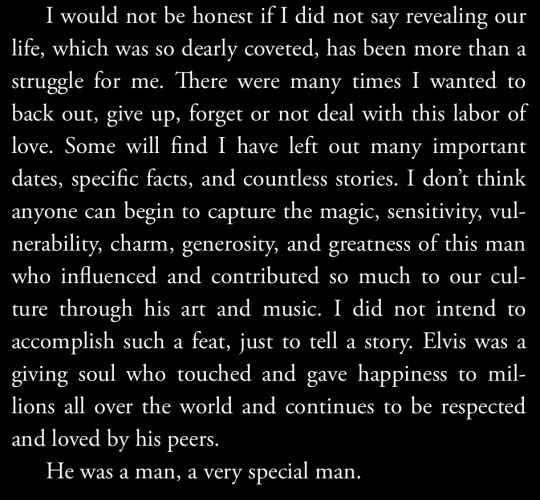
obviously we can only really speculate on what the film will be like but I’m just hoping and praying this film will be a massive disappointment to anyone who is thinking it will affirm their opinions about how Elvis “mistreated” Priscilla… that would heal my soul 😩 like if this film is just a total love letter to Elvis I will be laughing my way out of the theater lmaoo
at this point the only reason I’m not excited about this film is just because I don’t think it was done in a way that would reach it’s full potential. That recent review of it that came out of Reddit was kind of what I expected the film to be (lackluster, lacking depth and Jacob not really capturing Elvis’ essence… Coppola’s reasoning for casting Jacob was that since all the females in the audition room were enamored by him he must have had a similar charisma to Elvis but I just do not get that vibe😭 (no offense to Jacob stans)
as for what Lisa Marie would have thought of this film being made, I’d imagine she would act in a similar way to how Riley is. Supportive but not involved perhaps? This film is really Priscilla’s story. Not Elvis’ story, not Lisa Marie’s story etc. etc. so I don’t expect as many people in the Elvis world to be involved with it as they were with the 2022 film. Like I don’t expect to see Jerry Schilling doing interviews for this movie or girlfriend’s/friends of Elvis to give their review of it
I really really wish Lisa Marie was here, I miss her terribly and I still haven’t fully processed her passing, but I believe that Riley is doing everything her mother would have wanted, and I wish the best for her and her sisters 💗

#thank you 💗#what do y’all think about everything going on recently#Twitter has just been a dumpster fire for Elvis fans lately#everytime I see ‘Priscilla’ trending I get a migraine 😭#also I really hope a 2-3 minute trailer drops for this movie#that teaser gave absolutely nothing#elvis presley#elvisaaronpresley#elvis#priscilla presley#Priscilla movie#sofia coppola#Priscilla 2023#elvis asks#elvis fans
75 notes
·
View notes
Note
ion know how priscillas constant unnecessary comments is gonna help the presleys image of being racist. it doesn't help that Elvis borrowed or stole ( idk much about that) from black artists.
and priscillas constant belittling of mj just makes her look like a clown. she can claim she isn't racist by offering the poor black woman down the street some money and a coffee. but as soon a black person becomes more successful that ends up being a problem. she's like. " I love black people. As long as they aren't better than me."
Elvis sang songs he never wrote, basically what you’d call a cover, and most of ‘em were from black artists. These artists never got recognition for their own work, and were effectively left in Elvis’s shadow. Elvis’s record producer who was responsible for launching his career and that of Johnny Cash said “If I could find a White man who had the Negro sound and the Negro feel, I could make a million dollars.”
And then came Elvis. His “dances” were copied from black artists of the time and of the location. The famous toe stand that MJ then reclaimed, for example, and did it far better. That wasn’t Elvis’s move. It was part of the black community and culture. Just like the majority of MJ’s most iconic dances, the moonwalk included.
Had Elvis been a black man, he would’ve been nothing like the rest of the black artists of the time period that got ignored by said racist society. The biggest reason Elvis got recognition was because he was a white man. Even MJ said so, and said he and Lisa Marie acknowledged and often discussed it.
The songwriters and people that were used as stepping stones in Elvis’s career have never been widely acknowledged or praised. Hell, Otis Blackwell who wrote some of the best known Elvis songs wasn’t even acknowledged for it until after he died. It took until 2010 for him to be put in the rock n roll hall of fame.
MJ spoke a lot about the struggles of being a black artist in the time period. He himself struggled with it. MTV tried to refuse to show his video for Billie Jean because he was black, for example.
Priscilla is just jealous of Michael’s success, and that his legacy is going to outlive her and the Presley line. Matter of fact, it already did, cuz Priscilla ain’t no damn Presley by blood and no one else in that family makes music or is musically gifted like the Jackson’s
Was Elvis Presley himself a racist? Idk about that. But what I do know is that his career itself, and the fame that came with it, was a product of the racist time and society that hailed him “King”.
2 notes
·
View notes
Text
something that does have a real weight of sorrow for me in all these discussions about elvis, and portrayals of elvis, is that ultimately the overwhelming majority is some degree of projection, and that's rarely kept in mind. we don't know for certain how he felt about things which occurred in his life, how he perceived them, internalized them, because he never had the chance to tell his own story. every book written is from the perspective of its teller, whether it comes from love or greed, compassion or condemnation. every script and every actor is an interpretation, and by necessity condensed and fictionalized. whenever someone says something about the feminine view of the coppola movie, i think about how that's not as unusual as they seem to think it is, we have a swath of women's stories about him - linda, ginger, kathy, june, anita, mindi, and so on, they've shared their experiences and perspectives on him, like priscilla has, for decades (and those are remarkably consistent). this isn't me saying they shouldn't, they have the right to share their voices, and those accounts told are what we have as biographical record of him, but still, every individual naturally speaks from a place of personal bias. this is, of course, startlingly true with everything members of the mm have put out there as well.
people keep contrasting the luhrmann film with coppola's, and it's wildly missing the point because they're not even looking through the same lens. as much as i love baz's work and think the film is so affecting and beautiful, it's necessary to remember that elvis is actually NOT the pov character. that's our antagonist, parker. austin's remarkable and empathetic performance is the beating heart of the movie, but in many respects elvis (2022) isn't solely about elvis presley, and it's not supposed to be. it's about the struggle of empty capitalism vs. fulfilling creation and art, it's about exploitation and grief, it's about the upheaval and changing landscape of american culture and how this singular man was used as a lens through which to filter those shifts. his social consciousness is relevant because it's too often overlooked, or ignored altogether, in his legacy, and that, like his passion for music, like his spirituality, was essential to his soul and his artistry, but we also need to see that conflict of parker not having understanding for that hunger and grace because they're positioned as the dichotomy of a transforming age. its aim is focused on his influence and resonance as a performer, which is why it's often grand and kaleidoscopic. when the movie truly, wholly becomes dedicated to elvis is the switch flip during unchained melody. i'd argue, in fact, that's why it's powerful - we spend two and a half hours as an audience by intent, told this story, watching the rise and struggles of this man, but at a bit of a thoughtful remove, guided by the colonel, who doesn't even get why we're there. the colonel who tells us directly elvis' tragedy was love, and only we are allowed to perceive that love was also his triumph. the final moments of the film allow the crossing of that bridge, where it's between us and elvis, and the connection and legacy he left behind.
obviously i haven't seen priscilla (2023) and thus cannot comment on its narrative structure or portrayal, but can say that once again, the human being he was individually isn't intended to be the center. she's the focal point and the pov character and it's necessary to keep that in mind. elvis is the supporting player, no matter how large he may loom, in a story about a young woman's journey into a whirlwind and to self-discovery.
the trouble with all these varying accounts and portrayals, no matter how sensitively or salaciously done, is that elvis presley disappears into Elvis™ in the ensuing discussion. he becomes a cipher for whatever anyone viewing and commenting WANTS him to be - scintillating iconoclast or tragic disaster, brilliant musician or embarrassing hack, generous, pensive soul or overbearing, gauche cautionary tale. all of which easily becomes too simplistic or too judgmental, erasing his personhood and complexity and extraordinary humanism for the quickest possible sound bite.
there's no real point to me saying all this beyond it being something i feel is essential to remember and to process. he never told this in his own words, so we piece every account together (playing detective, as austin said), learn to differentiate the noise and the furor from the quiet, persistent truths, find the spirit of the person he was and his dreams and philosophies and heart that are left behind, that do still captivate and comfort people who listen.
this is why i don't feel like our job is to constantly go to war for him, or to try and prove haters hanging onto their ugliest possible opinions wrong (it hasn't worked for decades), because even in that tumult, threads are lost and value is obscured. it's not our responsibility to rescue his image. loving what he gave us is enough.
8 notes
·
View notes
Text
'BLUE MOON isn’t your typical biopic. Rather than trotting through Rodgers and Hart’s entire back catalogue, the film zeroes in on the heartbreaking juncture of 1943. The premise unfolds against the opening night of OKLAHOMA!, that seminal Rodgers and Hammerstein musical that forever changed Broadway’s trajectory. Yet, in the background lurks a different drama: Hart is on the verge of self-destruction, his battle with alcoholism pushing him away from Rodgers. The film captures those final sparks of their collaboration, illuminating the poignant truth that as OKLAHOMA! soared, Hart’s own fate spiralled. It’s a dual narrative—triumph meets tragedy.
Within that swirling emotional tempest, Ethan Hawke takes on Lorenz Hart. Early previews from the Berlin festival rave about Hawke’s ability to convey both the brilliance of a lyricist and the anguish of a troubled man. Then there’s Andrew Scott, stepping in as Richard Rodgers, the composer left to seek new partnerships when Hart’s demons proved insurmountable. Watching Scott receive the Silver Bear for Best Supporting Performance cements what many theatre aficionados have whispered for years: he is one of our era’s most chameleonic performers, effortlessly blending comedic nuance with heartbreak. And in the context of Rodgers—arguably overshadowed by the mythical Rodgers and Hammerstein brand—Scott’s role emphasises the composer’s complexities: the man who created BLUE MOON, THE LADY IS A TRAMP, and MY FUNNY VALENTINE was, after all, half of an earlier duo that once reigned supreme on Broadway.
Hart’s real-life story is every bit as gripping as any Hollywood script. Born with a poetic flair, he penned lyrics that fans still quote decades later. But by 1943, his personal struggles had grown too large to ignore. BLUE MOON reimagines those months leading up to Hart’s death, delivering a fresh spin on a narrative that’s often overshadowed by Rodgers’ subsequent success with Oscar Hammerstein II. Director Richard Linklater, known for BOYHOOD and an upcoming adaptation of MERRILY WE ROLL ALONG, applies his signature style—gentle pacing punctuated by striking emotional beats—to the film, ensuring it resonates beyond mere historical curiosity...
A Composer Often Outshone
We’ve all heard of Rodgers and Hammerstein. Their musicals—SOUTH PACIFIC, THE SOUND OF MUSIC, CAROUSEL, THE KING AND I—form the bedrock of the Golden Age of Broadway. Yet in BLUE MOON, we peer into the lesser-discussed phase of Rodgers’ career. Rodgers and Hart wrote ON YOUR TOES, PAL JOEY, and the aforementioned standards that soared on the radio waves, influencing countless singers. The album track Blue Moon, for instance, was recorded by everyone from Mel Tormé to Elvis Presley, making it a ubiquitous standard by the 1950s. You might argue that Rodgers’ melodic sense was at its sharpest when it complemented Hart’s biting, witty lyrics. This film illuminates Rodgers’ bridging of two legacies—the comedic, often jazzy style of Rodgers and Hart, and the grand, integrated musicals that defined Rodgers and Hammerstein.
One surprising detail gleaned from early festival Q&As is how Andrew Scott approached Rodgers with a certain vulnerability, playing him not merely as an ambitious composer but as a friend torn between loyalty and self-preservation. It’s easy to forget that behind Rodgers’ professional persona lay a man grappling with heartbreak—Hart was more than a collaborator; he was a friend, albeit a troubled one. In capturing that nuance, Scott apparently devoted weeks to studying Rodgers’ personal letters, aiming to reflect the emotional cost of pivoting from a decades-long partnership to forging a new path with Hammerstein. The result, so we’re told, is a heartbreak-laced performance that might well redefine how we see Rodgers in the public imagination.
A Tantalising Glimpse Of Broadway’s Shifting Tides
Set in 1943, the film situates us at a crossroads: Rodgers standing on the threshold of a major reinvention, Hart teetering on the edge of oblivion. Oklahoma! is about to redefine what musicals can achieve—seamless integration of song and story, a sense of narrative continuity we now take for granted. Meanwhile, Hart’s style is very much an earlier form, wry and sophisticated but rarely integrated in quite the same narrative manner. In focusing on that pivot, BLUE MOON underscores a tectonic shift in American theatre: the move from glitzy song-and-dance revues to musicals that told cohesive stories, front to back.
This is no minor moment in theatre history. If Oklahoma! soared, so did Rodgers. Soon, Hammerstein and he would earn a fortune, shape cultural mores, and generate household favourites like Some Enchanted Evening, Getting to Know You, and Edelweiss. Hart, in turn, receded into an almost tragic footnote, his brilliant mind snuffed out all too soon. The film’s release this May promises a rare glimpse of that transitional tension: a raw, human story about ambition, addiction, friendship, and the unstoppable march of theatrical progress.
If you’re a devotee of classic musicals, a lover of theatre history, or simply someone who can’t resist a stirring narrative of collaboration and heartbreak, BLUE MOON is shaping up to be a must-see. With Ethan Hawke and Andrew Scott at the helm—both giving what critics are touting as career-defining performances—this film transcends standard biopic territory. It breathes fresh life into a pivotal moment when Broadway’s future hinged on one revolutionary show, while an entire era was quietly fading with a single man’s final descent.
For Andrew Scott, the Silver Bear is the latest in a string of accolades that reinforce his reputation as an actor unafraid of emotional complexity. His Richard Rodgers is neither hero nor villain, but a conflicted artist forging ahead even as he mourns the dissolution of a once-inseparable creative team. Meanwhile, Lorenz Hart emerges from the shadows of Broadway lore, portrayed by Hawke in what some are calling a heartbreakingly human turn. The supporting cast, from Margaret Qualley to Bobby Cannavale, inject the story with warmth, humour, and heartbreak.
Slated for wide release in May, BLUE MOON beckons us to dive into a singular moment in musical theatre’s evolution—when Rodgers stepped onto the stage with Hammerstein’s new masterpiece, leaving Hart’s brilliance forever in the wings. Much like the show-stopping number that tugs at your heartstrings when you least expect it, this film aims to reveal the intricate harmony and painful dissonance behind Rodgers and Hart’s final coda. If the early reviews are any indication, we’re in for a deeply affecting cinematic experience—one that will remind us that the best art so often springs from the most complicated friendships, uncertain times, and hard-won second acts. Sometimes, indeed, life’s funniest valentine is also its saddest farewell.'
1 note
·
View note
Text
The Timeless Appeal of Lana Del Rey's Popular Songs
Lana Del Rey has long been an enigmatic presence in the music industry, captivating listeners with her cinematic aesthetic, haunting vocals, and nostalgic lyricism. Her ability to craft deeply personal yet universally resonant music has cemented her as a modern icon. Her songs blend melancholic storytelling with vintage Hollywood glamour, making her one of the most influential artists of her generation. Whether it's her deeply poetic lyrics or hypnotic melodies, Lana Del Rey continues to captivate audiences worldwide.
The Evolution of Lana Del Rey’s Music
From her debut under the name Lizzy Grant to her breakthrough with Born to Die, Lana Del Rey has continuously reinvented herself while staying true to her signature melancholic sound. Her discography showcases a fusion of baroque pop, dream pop, and alternative rock, often interwoven with themes of love, fame, and heartbreak.
Her rise to fame was anything but conventional. Born Elizabeth Woolridge Grant, Lana Del Rey initially struggled to find her place in the music industry. She experimented with different sounds and personas before ultimately crafting the sultry, cinematic style that fans adore today. With Born to Die (2012), she introduced the world to a dreamy yet dark soundscape filled with romanticized tragedy and grandeur.
Following the success of her debut, she continued to build her legacy with albums such as Ultraviolence, Honeymoon, Lust for Life, and Norman Fucking Rockwell! Each record showcased a different side of her artistry, proving her ability to evolve while maintaining the core essence of her music.
If you’re exploring her best works, check out this curated list of Lana Del Rey popular songs that highlight her evolution as an artist. Songs like Summertime Sadness, Video Games, and Ride exemplify her poetic storytelling and hypnotic melodies.
Signature Themes in Lana Del Rey’s Music
One of the most remarkable aspects of Lana Del Rey’s music is her ability to paint vivid pictures of nostalgia, heartbreak, and doomed love. Many of her songs focus on longing and loss, often drawing inspiration from 1950s and 1960s Americana. The imagery of California highways, fast cars, faded Hollywood dreams, and tragic romance is a recurring motif in her work.
Her lyrics often reference themes of fatal attraction and self-destruction. In Born to Die, she explores the idea of fleeting love, while Ultraviolence takes a darker turn, discussing toxic relationships and emotional turmoil. Despite the often somber tones of her songs, there’s an undeniable beauty in the way she tells stories, making her music both haunting and captivating.
She also touches on themes of fame and its burdens. Songs like Young and Beautiful reflect on the transient nature of stardom, questioning whether love and admiration will last beyond youth and beauty. This introspective approach is what sets her apart from many other artists in the industry.
Musical Influence and Unique Sound
Lana Del Rey’s music is a blend of various influences, from old Hollywood to jazz, blues, and classic rock. She has often cited artists like Elvis Presley, Nancy Sinatra, Bob Dylan, and Leonard Cohen as inspirations. Her vocal delivery, which alternates between breathy whispers and deep, sultry tones, adds to the ethereal quality of her music.
Her production choices also play a crucial role in shaping her sound. Many of her songs feature orchestral arrangements, cinematic soundscapes, and lo-fi aesthetics that transport listeners into a dreamy world of vintage glamour. Whether she’s incorporating hip-hop beats, electric guitars, or sweeping strings, her music always carries an unmistakable Lana Del Rey essence.
Impact on the Music Industry
Lana Del Rey’s influence on the music industry is undeniable. Since her rise to fame, countless artists have cited her as an inspiration. Singers like Billie Eilish, Lorde, and even mainstream pop stars have incorporated elements of her dreamy, melancholic aesthetic into their work. Her ability to seamlessly blend old-school elegance with modern sensibilities has paved the way for a new era of alternative pop.
Her music has also received critical acclaim. Norman Fucking Rockwell! was widely regarded as one of the best albums of the decade, earning a Grammy nomination and solidifying her reputation as one of the most innovative songwriters of her time. Critics and fans alike praise her ability to craft deeply evocative music that resonates on a personal level.
Beyond her music, Lana Del Rey’s aesthetic has become a cultural phenomenon. Her vintage-inspired fashion, cinematic music videos, and poetic social media posts have cultivated a devoted fanbase. She embodies a unique blend of old Hollywood sophistication and modern-day introspection, making her one of the most intriguing artists in contemporary music.
A Lasting Legacy
As she continues to release new music, fans eagerly await the next chapter in her illustrious career. Each album brings a new dimension to her artistry, proving that she is far from a one-dimensional performer. Whether she’s delving into themes of nostalgia, romance, or existentialism, her music consistently resonates with listeners on a deep emotional level.
Her ability to create immersive sonic experiences sets her apart from many of her peers. While trends in the music industry come and go, Lana Del Rey’s sound remains timeless. Her music isn’t just something to listen to—it’s something to experience, something that transports listeners to another era, another emotion, another world.
Related Articles:
For further reading, explore these related articles:
Celebrate the Chill: Best Winter Season Songs for Every Mood
Kanye West's New Album: Everything You Need to Know!
Michael Jackson’s Most Popular Songs: A Journey Through the King of Pop’s Magic
Best Karaoke Songs Album Songs: Sing Your Heart Out!
For additional resources on music marketing and distribution, visit DMT Records Private Limited.
0 notes
Text
What Country is Best for Music? A Global Perspective
Music is a universal language that transcends borders, uniting people worldwide. Each country boasts its own unique musical heritage, often shaped by history, culture, and innovation. But a question that frequently arises is: what country is best music in the world?
While the answer is subjective, it’s worth exploring the cultural, technological, and creative contributions of various nations to understand what makes their music exceptional. This article delves into the factors that define the musical supremacy of different countries, from their rich traditions to their adoption of modern technologies.
The United States: A Powerhouse of Genres
When discussing influential music, it’s impossible to ignore the United States. The country has birthed countless genres, including jazz, blues, rock, hip-hop, and country. Artists like Elvis Presley, Michael Jackson, and Beyoncé have shaped global music trends, and the U.S. remains a hub for creative innovation.
The American music industry’s infrastructure also plays a role in its success. Platforms like Sony Music Publishing ensure that artists receive the support and exposure they need to thrive. These organizations manage intellectual property, provide access to global audiences, and help artists develop their craft.
South Korea: The K-Pop Phenomenon
South Korea has become a global sensation thanks to its K-pop industry. Groups like BTS and BLACKPINK have gained worldwide recognition, breaking language barriers and dominating charts. The secret to their success lies in meticulous production, intense training programs, and innovative use of technology.
Producers often combine traditional Korean instruments with modern STEM music techniques to create a unique sound that appeals to a diverse audience. Furthermore, K-pop’s integration of social media allows fans to interact directly with their favorite artists, fostering a sense of community that fuels the genre’s global appeal.
The UK: A Legacy of Iconic Bands
The United Kingdom has given the world some of the most iconic music groups, including The Beatles, The Rolling Stones, and Queen. British music often combines innovation with deep-rooted traditions, resulting in a sound that resonates universally.
What sets the UK apart is its ability to constantly reinvent itself. From the punk rock movement of the 1970s to the rise of electronic dance music, British artists have consistently led the charge in defining global trends. Today, the UK remains a breeding ground for experimental sounds, attracting creators from around the world to collaborate and innovate.
Nigeria: The Afrobeat Revolution
Nigeria has emerged as a cultural hotspot, thanks to the global success of Afrobeat. Artists like Burna Boy and Wizkid have put Nigerian music on the map, blending traditional rhythms with contemporary elements.
The genre’s rise can be attributed to its infectious beats and relatable lyrics, which often address social and political issues. The use of modern production techniques has also played a role in amplifying Afrobeat’s global reach. Platforms like Sony Music Publishing support these artists by providing resources and opportunities to connect with international audiences.
India: A Blend of Tradition and Innovation
India’s music industry is one of the largest in the world, deeply rooted in tradition while embracing innovation. Bollywood songs dominate the scene, often blending classical Indian instruments with contemporary pop elements.
India’s adoption of STEM music technologies has allowed producers to experiment with new sounds, creating music that resonates with both domestic and international audiences. The country’s rich musical heritage, combined with its willingness to evolve, ensures its place as a significant contributor to the global music landscape.
Factors That Define a Country’s Musical Supremacy
Cultural Heritage: A country’s history and traditions heavily influence its music, giving it a distinct identity.
Innovation: Embracing technology, such as AI and immersive production tools, keeps music relevant and competitive.
Global Reach: Platforms like YouTube, Spotify, and Sony Music Publishing enable artists to share their work with a worldwide audience.
Community Support: Fan engagement through social media and live performances fosters loyalty and growth.
Conclusion: Music as a Reflection of Culture
Every country contributes something unique to the global music tapestry. Whether it’s the innovation of STEM music in South Korea, the rhythmic allure of Afrobeat from Nigeria, or the timeless melodies of British bands, each nation has its strengths.
While it’s impossible to determine definitively what country is best music in the world, exploring these diverse sounds enriches our appreciation for music. Ultimately, the best music comes from artists and cultures that inspire and connect with listeners worldwide.
0 notes
Text
Discover the Best Free Oldies Music Portal for Songs from 1935 to 1989
In today's fast-paced digital age, finding a reliable source for classic tunes can be a delightful escape into the past. A dedicated portal offering free oldies music from 1935 to 1989 serves as a treasure trove for music lovers, providing access to timeless melodies that have shaped generations. This article explores the specialty of such a portal and highlights why it's an invaluable resource for fans of vintage music.
Comprehensive and Curated Collections One of the standout features of a free oldies music portal is its meticulously curated collections. Free oldies music portal for songs from 1935 to 1989 often categorizes music by decade, genre, and artist, allowing users to easily navigate and discover songs that resonate with their tastes. Whether you are a fan of Frank Sinatra, Elvis Presley, The Beatles, or Diana Ross, you can find extensive playlists that showcase the best of each era.
High-Quality Audio and User Experience Despite being free, these portals often prioritize high-quality audio to ensure that the listening experience is as authentic as possible. Advanced streaming technology and user-friendly interfaces make it easy for users to find and play their favorite tracks without interruptions. Features such as personalized playlists, recommendations, and easy-to-use search functions enhance the overall user experience, making it a joy to revisit the classics.
Educational Value and Cultural Preservation A free oldies music portal is not just a source of entertainment; it is also an educational resource that preserves and promotes cultural heritage. For younger generations, it offers an opportunity to learn about the music that influenced their parents and grandparents. For older listeners, it provides a nostalgic trip down memory lane.
Community and Engagement A reputable free oldies music portal for songs from 1935 to 1989 fosters a sense of community among its users. Forums, comment sections, and social media integrations allow fans to connect, share their favorite songs, and discuss the music that has touched their lives. This sense of community enhances the enjoyment of the portal, as users can bond over shared memories and musical tastes.
Accessibility and Convenience The convenience of accessing a wide range of oldies music for free cannot be overstated. With just a few clicks, users can stream their favorite tracks on various devices, including smartphones, tablets, and computers. This accessibility ensures that classic tunes are always within reach, whether you are at home, commuting, or on a road trip.
A free oldies music portal for songs from 1935 to 1989 is a priceless resource for music enthusiasts of all ages. It offers a comprehensive, high-quality, and user-friendly platform to explore the rich tapestry of musical history. By preserving and promoting classic tunes, these portals ensure that the legacy of past musical greats continues to inspire and entertain future generations.
0 notes
Text
Elvis is Everywhere
In this podcast episode, Julian, Steve, and Arthur are joined by producer Mike in a rich discussion about Elvis Presley's profound influence on the entertainment industry. They reminisce about Elvis's captivating performances, his controversial gyrations, and his groundbreaking role in popularizing rock and roll. The conversation covers the strategic management by Colonel Tom Parker, Elvis's transition from movies to live shows in Las Vegas, and the missed opportunities in his career. Personal anecdotes reveal Elvis's interactions with fans and the challenges he faced, including financial struggles and drug use. The episode paints a comprehensive picture of Elvis's legacy, his cultural impact, and the lasting significance of his work in music and film.
Tales From Hollywoodland on Facebook https://www.facebook.com/talesfromhollywoodland
Tales From Hollywoodland on Instagram https://www.instagram.com/talesfromhollywoodland/
Tales From Hollywoodland on YouTube https://www.youtube.com/channel/UCdLX2kbwHqdn47FNN6vVN7Q
We want to hear from you! Feedback is always welcome. Please write to us at [email protected] and why not subscribe and rate the show on Apple Podcast, Spotify, iHeartRadio, Goodpods, PlayerFM, YouTube, Pandora, Amazon Music, Audible, and wherever fine podcasts are found.
#TalesFromHollywoodlandPodcast #ElvisPresleycareer #ElvisPresleydiscussion #Elvismusiclegacy #ElvisPresleymovies #Elvisrockandroll #KingofRockandRoll #ElvisHollywoodcareer #ElvisPresleyachievements #ElvisPresleyhistory #ElvisPresleyinfluence #ElvisPresleypopculture #ElvisPresley #ElvisPresleyimpact #ElvisPresleylegacydiscussion #Podcast
Check out this episode of Tales From Hollywoodland!!
#Hollywood History#Celebrity Stories#Golden Age of Hollywood#Behind-the-Scenes Secrets#Movie Industry Legends#Hollywood Landmarks#Classic Hollywood Tales#Iconic Film Moments#Vintage Hollywood Gossip#Studio System Stories#Tinseltown Legends#Hollywood Scandals#Old Hollywood Glamour#Film Industry Trivia#Silver Screen Secrets#Hollywood Iconography#Famous Film Sets#Hollywood Insider Stories#Cinematic Nostalgia#Hollywood Culture#Tales From Hollywoodland#Podcast
0 notes
Link
0 notes
Note
Funny story: I was first introduced to the "No Pakistanis" version of Get Back through a callout post on Tumblr back in the early '10s. It took the song WAY out of context and painted them as a bunch of anti-immigrant racists. I had never looked further into it because of that, fearing that I couldn't look at the band the same way. Fast forward to the new Get Back movie, and I was relived to see that was meant to be a satirical jab at the anti-immigrant sentiment in the UK at the time. (cont.)


Hi anon, thanks for the ask! :)
This is a really interesting topic that I’ve thought about on and off for some time so thanks for giving me the push to discuss this!
I think the two main factors behind the negative takes on John are the natural negative pushback to his deification and the advent of the internet.
I think Goldman’s book was certainly one of the first to take aim at the myth of St John, along with books from May Pang, John Green etc. I haven’t read Goldman’s book, but from what I understand, his book was almost universally negative, no context was given to John's actions, evidence of John's good nature was ignored and the agenda behind it was clearly to tear down the messianic image of John that was born on 8 December 1980. When Goldman’s book came out it was trashed by Yoko, Paul, Rolling Stone, pretty much anyone who had anything to do with the Beatles implored the general public not to read or believe it and, by and large, that’s what happened, it was a critical and commercial failure. I think, even by 1988 when The Lives of John Lennon was released, the general public weren’t ready to confront the less savoury aspects of John’s personality and life that were (gleefully) recounted in Goldman’s book. The fact that the book had the bipartisan condemnation of Paul and Yoko made it easy to dismiss it as unfounded lies by the same man who had also published a similar hit piece on Elvis Presley. It didn’t help Goldman that when he was confronted with criticisms he was arrogantly defiant and, on publication, from what I understand, a series of his sources came out to say that their words had been misrepresented or taken out of context. In the late 80s there was no demand for the content of Goldman’s book, its findings were universally rejected and Albert Goldman, as a person, was the ideal hate figure, all in all, on release and in the years subsequent, Goldman’s book didn’t do much to move the dial in the way John and his legacy were perceived.
However, as John’s murder got more distant and became more of a historical event than a contemporary tragedy, I think people were able to view John more objectively. A factor in this was that those who were close to him in life (Paul, Yoko, Cynthia, Julian etc.) were more comfortable talking about the negative side of John’s personality, addressing the fact that he was more than a symbol of peace, but had actually been a flawed man, friend, husband and father. With respect to Goldman, as the decades have gone by, aspects of his book have been confirmed as fact (i.e. Yoko's heroin relapse in the late 70s/early 80s) and prominent Beatles authors (Doggett, Lewisohn etc.) have praised the level of research Goldman did for his book, making it harder to dismiss the John portrayed as complete fiction. I also think, that after a certain point, the deification push from the Lennon Estate reached a saturation point where, after that, it was just diminishing returns, the more and harder the estate pushed it, the less likely people were to believe it. The general public loves to raise up celebrities and put them on pedestals but more than that, they love to knock them off, so I think that’s what happened with John, that natural instinct to want to pull a celebrity down a peg or two collided with the other great equaliser, the advent of the internet.
I think in the 80s and 90s, pre the advent of the internet, the print media and the Beatles/estates had a lot more control over their narratives. If you wanted to know anything about the Beatles you could get a biography, watch a documentary (Compleat Beatles, Anthology etc.), watch interviews or read articles on the band and their history (Rolling Stone, Mojo, etc.) there was only so much information you could find and a lot of it was directly controlled or influenced by the Beatles/estates (granting interviews to publications that gave them favourable reviews, maintaining friendships with magazine editors/authorising books on their lives and granting those books access to close associates and archives) I think the influence that the Beatles had on narratives and their public perception started to breakdown when the internet started to gain traction.
The point that I come back to is that the internet is the place that nuance comes to die. I think people get a kick out of making statements, or taking things out of context (I.e. "John Lennon was a wife beater", "the Beatles were racist", "John abandoned Julian" etc.) once these types of statements are out there, they spread round the internet like wildfire and any additional context or nuance is beaten away to leave a sound bite that’s easy to digest till all you have left is a caricature where a human once was.
With the internet, it became a lot easier to find resources that were going counter to the myth built up by the Lennon Estate, you could read up on Goldman’s takes, May Pang’s, John Green’s, Fred Seaman’s, all books that took chunks out of the ballad narrative that had been spun for decades. Fans were finding it easier to mobilise on online forums to discuss topics, such as the Lost Weekend, that were pretty much taboo in mainstream media, all of these otherwise off limit talking points now had a home on the internet and I think that helped to move the dial on what people were willing to believe about John and the extent they were going to swallow what his Estate had been giving them for years, I think that groundswell attitude also seeped into the mainstream media.
I think things really start to come to a head when people detect any hint of hypocrisy. The Lennon Estate for decades, and even to an extent to this day, built John up as an icon of peace and a proponent of non-violence. The song most prominently pushed by his Estate is Imagine, that song alone is the corner stone of the image of John they project but John himself, during his lifetime, made it clear that Imagine was just a song, not his timeless manifesto. Before I got into the Beatles fandom, you could have told me that John was murdered the day after he released Imagine and I would have believed you, his Estate doesn't seem to want to acknowledge that he released anything after Imagine (aside from Double Fantasy of course), that strategy helped to build up his mythology but it’s also been the biggest source of its downfall. It's hard to sell John as a peace loving, non violent, politically strident hippy to a generation who has the internet at their fingertips and can easily google quotes from Cynthia, May Pang, even John himself, discussing his violence. It's hard to push the image of John as the househusband devoted to raising Sean, being married to Yoko and only baking bread, when Julian has given plenty of interviews about being abandoned by his father, when Yoko herself has admitted to using heroin into the 80s and when May Pang has spoken about maintaining a sporadic sexual relationship with John well after the end of the Lost Weekend. I think the commodification of John worked better pre-internet when it was a lot harder to do independent research into John, past the way he was described in mainstream media, once the internet came around there was an overload of information that anyone could access, a lot of information that the Lennon Estate didn't want shared and that filled in the gaps in the story that the Estate had glossed over.
Ultimately, I think in this current age of celebrity people really value authenticity and they're really suspicious when it looks like they're being fed a fairytale. Because the Lennon Estate weren't proactive in sharing the less savoury aspects of John's life (i.e. promoting the man that John was rather than the myth they created) there's now a disconnect between the John they promote (serious, peace-motivated aggravator and one half of "JohnandYoko") and the John people use to tear down the sainted image (wife-beating, politically hypocritical, absent father in a sham marriage). I think both versions of John lack nuance and don't reflect the complex human he was (as we all are of course). Even with Get Back, you saw the disconnect between actual John and the versions of him that have dominated public discourse in the last decade or so ("John was funny?!!" "John didn't spend 100% of his time being angry" "John was actually a caring person to someone other than Yoko after 1968?!!").
So to bring this long winded ramble to an end, I don't think Goldman is the ultimate reason behind the negative takes you see about John on social media. I think the two underlying reasons are the passage of time (John is no longer the sacred cow he was in the 80s/90s, people are a lot more comfortable talking about his flaws) and the dominance of the internet as a medium in celebrity discourse (prevalence of clickbait, poorly researched information getting passed off as facts and barely a hint of nuance). I don't think Goldman's book is that widely read per se, at least when it comes to the widespread condemnation that John gets in some internet circles, but I think a lot of his research has gained in credibility over time so it's very likely that his findings will become more prevalent as time goes on, hopefully if that's the case, that information is presented in the proper context and with the appropriate level of nuance.
#the beatles#john lennon#asks#albert goldman#the lives of john lennon#historiography#opinions#sorry for rambling if i haven't answered your question please let me know!!!#interested to see what people who were around in the 80s think about the progression in the way john has been perceived
48 notes
·
View notes
Photo
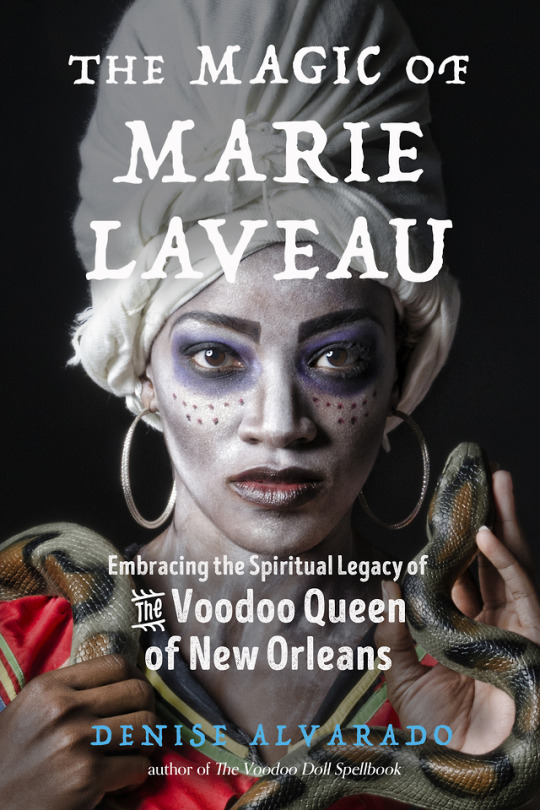
My new book is available for preorders here: https://amzn.to/2XBWhyn
This book is unlike all the others written about Marie Laveau. It’s not just a biography, nor is it just a spellbook. It is much more than either of those types of books. But before I share with you an excerpt from the book, I have seen people ask about me on Tumbler and assume my ethnicity and background. To set the record straight, I am Creole, born and raised in New Orleans. I was introduced to the Mysteries at the age of 6 by my aunt and have spent a lifetime practicing, growing and learning about New Orleans Voudou and related traditions of Southern rootwork and conjure. I write from an insiders’ perspective and often share information others have not heard of before as a result. Trust, there is a whole lot of nonsense out there about Marie Laveau that needs to be cleansed from the practitioner’s palette - in my humble opinion, of course. When you are born and bred, you got the goods, and I spill the tea in this book!
Here’s an excerpt from the Introduction to give you an idea of what to expect:
If Marie Laveau were alive today, I truly believe she would be at the forefront of the #MeToo and #BlackLivesMatter movements. I envision her standing in front of the White House as a #SisterResister, protesting the current administration’s racist policies, attacks on health care and the environment. Instead of Alyssa Milano, it could have been Marie Laveau sitting behind Brett Kavanaugh at those now notorious SCOTUS hearings that mobilized the female warrior aspect of the country like never before. She would be advocating prison reform, laying the gris gris down at the border for those seeking a better life or in need of asylum, and making sure no one forgets there are children held in cages in internment camps for brown people right now, at this present moment in time, in post-slavery America. But the reason she would be doing these things might surprise a lot of people who are unfamiliar with her as a living, breathing human being. Marie Laveau is no myth; she is no mere legend. While her reputation precedes her as the notorious Voudou Queen of New Orleans, she was also a devout Catholic, an independent businesswoman, a free woman of color, a mother, and healer who lived her life in accordance with the Corporal Works of Mercy. Her belief in Catholicism guided her life as well as her magic in such a distinct way that people from all over the world are inspired by her spirit and her story. This phenomenon is evidenced by the fact that her grave site is purportedly one of the most visited pilgrimage sites in the United States, second only to the King of Rock and Roll, Elvis Presley.
There have been many books written about Marie Laveau that either focus on her life and legend or are popular spellbooks, pamphlets or fictional novels. I wanted to write a different kind of book – one that describes her magical and spiritual legacy with distinct practices found among Laveau devotees of past and present. I wanted to then be able to present the information in this book as a true working grimoire, one that has been thus historically and culturally authenticated as much as possible. Hence, what you will find in the following pages include stylistic workings attributed to her as identified in the aforementioned sources along with oral tradition as a primary indigenous information source. This latter source of information – oral tradition by actual Voudou and Hoodoo practitioners - has been sorely lacking in the available literature. What sets this book apart is that I am both a cultural anthropologist as well as a New Orleans Voudou insider with specialized knowledge of multiple folk traditions – a tradition keeper - which I have chosen to share with the world rather than take with me to my grave. That fact allows me to share with my readers a unique, twenty-first century, practitioner-scholar perspective that has been heretofore undocumented.
This book is divided into three parts. Part 1: La Belle de Nouvelle Orleans focuses on Marie Laveau as a woman, healer, Catholic, and businesswoman. It highlights key events in her life and introduces key players and myths in the Laveau legend as well as her contribution to the evolution of New Orleans Voudou from its African roots. From this exploration, I make the case for a specific type of New Orleans Voudou I call Laveau Voudou. Part 2: Becoming a Devotee discusses what it means to become a Laveau devotee, including how to create an altar to the Voudou Queen and and how to petition her. This section and the next are dedicated to the practitioner interested in learning how to serve Marie Laveau in a meaningful and culturally respectful way. Part 3: A Laveau Grimoire is a working grimoire of conjures, cures, roots and remedies in the Laveau Voudou tradition. It consists of two sections: a) Conjures, Cures, Roots and Remedies, which breaks down the eleven categories of conjure in the Laveau Voudou tradition along with examples of each, and b) Formulas and Receipts, which provides a list of remedies, products and formulas from the late 19th and early 20th centuries, including those attributed to Marie Laveau.
In total, The Magic of Marie Laveau: Embracing the Spiritual Legacy of the Voodoo Queen of New Orleans provides a pathway for culturally respectful devotion to the Holy Mother of New Orleans Voudou for anyone seeking to incorporate her style of magic into their lives and develop a working relationship with her.
26 notes
·
View notes
Note
yahoo. com/entertainment/riley-keough-priscilla-presley-lisa-marie-presley-graceland-200958899. html
riley's interview was quite lovely and vulnerable, i feel so much for everything she's been through. her comment that graceland was a place that held positive and beautiful memories for her, but is now a place of tremendous sorrow in her life broke my heart, though it's entirely understandable.
it still feels wrong for lisa to not be here. "She was just so unapologetically herself in every circumstance, and so strong... The life she had was not easy, and the treachery she endured and the lack of real love and real friends... She definitely had some great friends and relationships in her life, but I don’t think she really ever had... People were just coming for her since she was born — wanting something from her and not being totally authentic. She had to develop very thick skin. She was a very powerful presence and extremely loving and extremely loyal and sort of a lioness — a fierce woman, and a really wonderful mother... She was the best mom." :( (the most terrifying thing in my life is the thought of losing my mom, this hits me hard...)
and frankly i need everyone to calm down about cilla wanting to be laid to rest at graceland, considering the hand she's had in the legacy work, and riley said it all: "She said, "Things with Grandma will be happy" now that it's settled. "They’ve never not been happy... There was a bit of upheaval, but now everything’s going to be how it was." She called Priscilla "a beautiful woman" and credited her for being "a huge part of creating my grandfather’s legacy and Graceland. It’s very important to her. He was the love of her life. Anything that would suggest otherwise in the press makes me sad because, at the end of the day, all she wants is to love and protect Graceland and the Presley family and the legacy. That’s her whole life. So it’s a big responsibility she has tried to take on. None of that stuff has really ever been a part of our relationship prior. She’s just been my grandma.” As for reports that Priscilla, who divorced Elvis in 1973, wouldn't be able to be buried at Graceland, Riley said, "If she wants to be, of course... Sharing Graceland with the world was her idea from the start."
tbh i hope her speaking on the record puts some things to rest and brings some peace for that family, they have been through more than enough trauma and grief and deserve time to coalesce, and however the estate and everything else moves forward, i wish the best for her and the girls, they didn't choose to have that legacy or those losses and it's a lot to carry, and none of them are obligated to. i don't like a lot of what the estate/EPE is doing right now, but the family deserves to prioritize whatever is best for their well-being.
5 notes
·
View notes